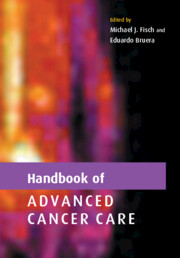Book contents
- Frontmatter
- Contents
- List of contributors
- Preface
- Acknowledgements
- PART I General concepts in oncology
- 1 Principles of diagnosis and staging
- 2 Principles of palliative chemotherapy
- 3 Principles of palliative surgery
- 4 Radiotherapy for palliation of symptoms
- 5 ABCs of clinical trials
- 6 Principles of cancer rehabilitation
- 7 Principles of palliative nursing
- 8 Ethics of decision making towards the end of life
- 9 Breaking bad news
- 10 The use of complementary/alternative medicine
- 11 Understanding “hospice”
- 12 Practical aspects of home care
- 13 Cultural differences in advanced cancer care
- 14 Implementing social services
- 15 Pastoral care
- 16 Bereavement
- Part II Primary tumors
- Part III Management of specific symptoms and syndromes
- Index
- References
7 - Principles of palliative nursing
Published online by Cambridge University Press: 04 August 2010
- Frontmatter
- Contents
- List of contributors
- Preface
- Acknowledgements
- PART I General concepts in oncology
- 1 Principles of diagnosis and staging
- 2 Principles of palliative chemotherapy
- 3 Principles of palliative surgery
- 4 Radiotherapy for palliation of symptoms
- 5 ABCs of clinical trials
- 6 Principles of cancer rehabilitation
- 7 Principles of palliative nursing
- 8 Ethics of decision making towards the end of life
- 9 Breaking bad news
- 10 The use of complementary/alternative medicine
- 11 Understanding “hospice”
- 12 Practical aspects of home care
- 13 Cultural differences in advanced cancer care
- 14 Implementing social services
- 15 Pastoral care
- 16 Bereavement
- Part II Primary tumors
- Part III Management of specific symptoms and syndromes
- Index
- References
Summary
Leaders in end-of-life care recently developed a set of precepts for palliative care:
palliative care refers to the comprehensive management of the physical, – psychological, social, spiritual and existential needs of the patient, in particular those with incurable, progressive illnesses. Palliative care affirms life and regards dying as a natural process that is a profoundly personal experience for the individual and family. The goal of palliative care is to achieve the best possible quality of life through relief of suffering, control of symptoms and restoration of functional capacity while remaining sensitive to personal, cultural and religious values, beliefs and practices
The following two case reports illustrate the acute and chronic nature of palliative care in cancer nursing. They also demonstrate that relationships, trust, and continuity are important, and that a full and “human” assessment of the patient and family is critical if their needs are to be met.
CASE 1
RG is a 45-year-old man who was diagnosed with advanced gastric cancer one month prior to admission to the cancer center. He is divorced, has two adult daughters, three grandchildren, and lives with his fiancée who is 5 months pregnant. He has a recent history of drug abuse including opioids and crack cocaine, and had been in a methadone maintenance program. On admission to the cancer center he was cachectic, had severe abdominal pain, gross ascites, early satiation, nausea and vomiting, insomnia, fatigue, and general irritability.
RG was not a surgical candidate but was offered chemotherapy, which he accepted. During the 2-week hospital admission he had his ascites drained, a PEG feeding tube inserted, a PORT placed for central venous access, and was started on a parenteral infusion of morphine sulfate for pain.
- Type
- Chapter
- Information
- Handbook of Advanced Cancer Care , pp. 51 - 57Publisher: Cambridge University PressPrint publication year: 2003



